Introduction
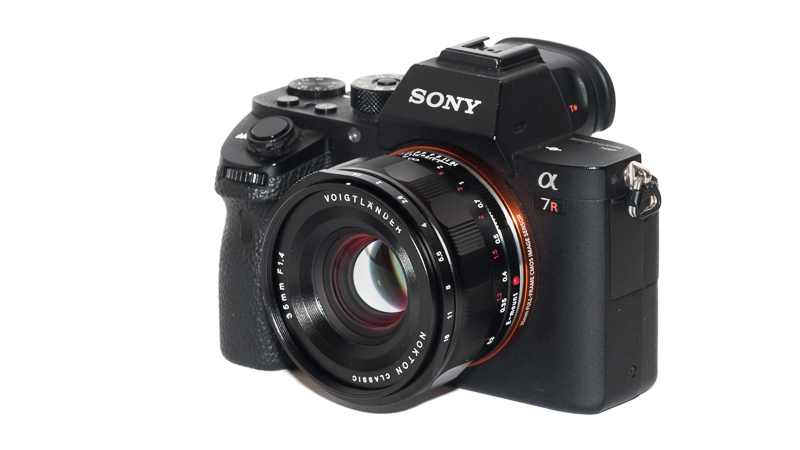
The Voigtlander 35mm 1.4 Nokton E “classic” was announced alongside the Voigtlander 40mm 1.2 Nokton E and after a slight delay just hit the shelves (02/18). The “classic” designation relates to the heritage of this lens as its symmetrical optical design is very similar to the older M-mount 35mm 1.4. What can we expect from Voigtlander’s first classic E-mount lens?
Sample Images
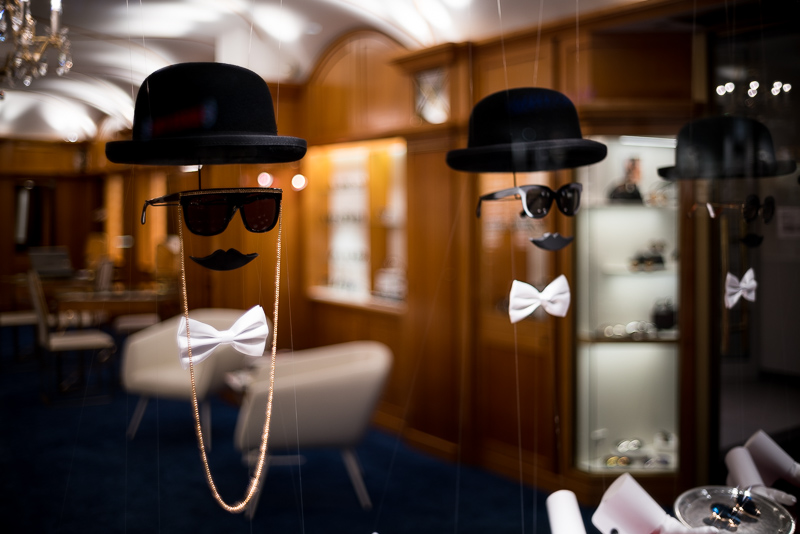
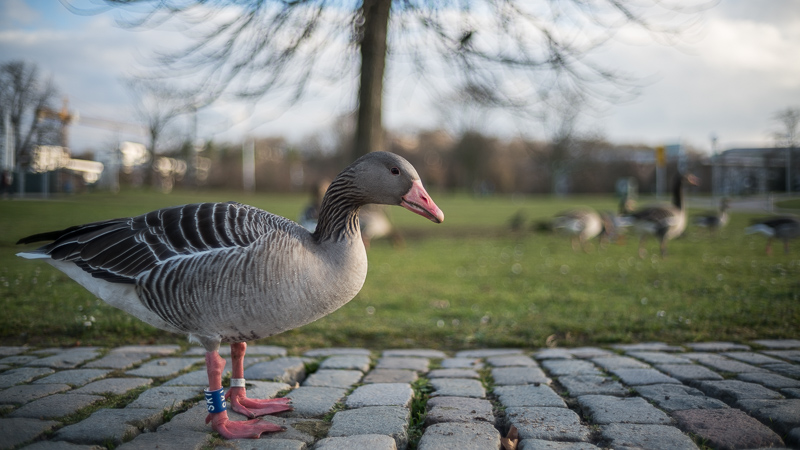
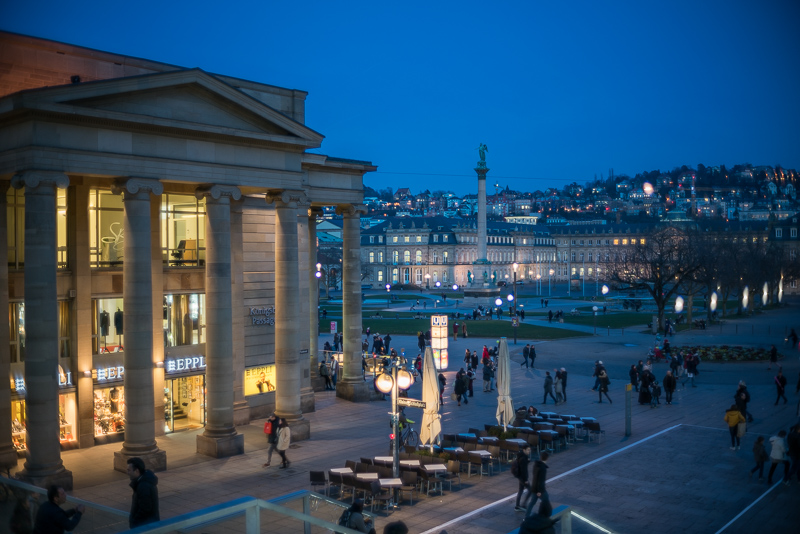
Most of the sample images in this review can be found in full resolution here.
Disclosure
The Voigtlander 35mm 1.4 Nokton E Classic was kindly provided free of charge by Voigtländer Germany (Ringfoto) for reviewing purpose for a duration of 4 weeks.
Version History
In E-mount Voigtlander has released only the 40mm 1.2 Nokton E in this focal length range so far. In M-mount Voigtlander released the closely related but not identical 1.4/35 some time ago. It comes in two variants: single- and and multi coated.
Specifications
The Voigtlander 1.4/35 FE has the following specifications:
-
- Diameter: 67 mm
- Field of view: 63° (diagonally)
- Length: 39.6 mm
- Weight: 262g
- Filter Diameter: 58 mm
- Number of Aperture Blades: 10 (straight)
- Elements/Groups: 8/6
- Close Focusing Distance: 0.3 m
- Maximum Magnification: 1:6.3
- Mount: Sony-E
You may also have a look at Voigtlander’s official page.
New this lens costs as much as $799/749€. You can find it at CameraQuest, B&H, on amazon.com/amazon.de and also on ebay.com/ebay.de (affiliate links).
Handling / Build Quality
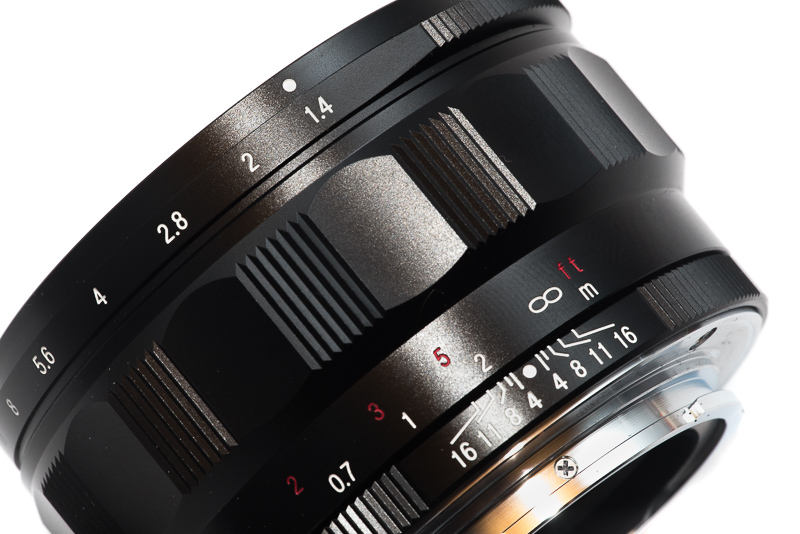
So far none of the Voigtlander E-mount lenses disappointed in this category and this holds true for the new 35mm 1.4 classic as well. The focus ring has perfect resistance and travels ~120° from the minimum focus distance (0.3m) to infinity.
The aperture ring has 1/3 stop click stops again which I think is a bit too much. I prefer 1/2 or even full stops. It travels about 110° from f/1.4 to f/16.
All markings are painted and engraved and there is a small metal screw in type hood in the package as well.
While the Voigtlander 5.6/10, 5.6/12, 4.5/15 and 1.2/40 offer a de-click function for the aperture the 1.4/35 doesn’t, just like the 2/65.
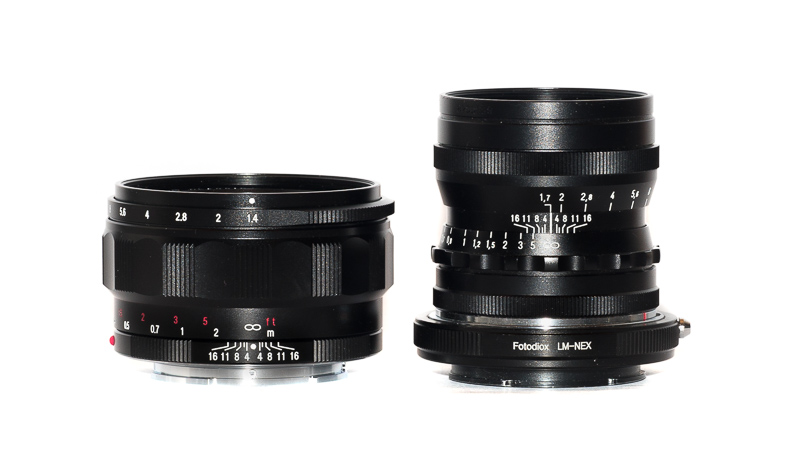
Vignetting / Colorcast
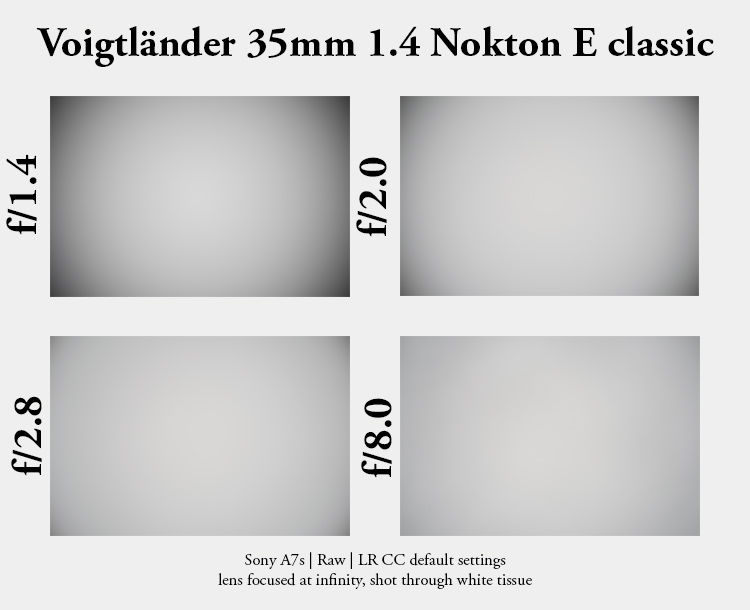
As this lens features a symmetrical optical design I was expecting rather high vignetting figures. And wide open there is very strong vignetting of roughly 3.4 EV (it equalizes the previous record holder the Leica 35mm 1.4 FLE), stopped down to f/2.0 vignetting improves to still rather strong 2.6 EV, at f/2.8 it is 1.9 EV and at f/8.0 still 1.2 EV. This is not an unusual performance for a lens like this; the small diameter certainly takes its toll here.
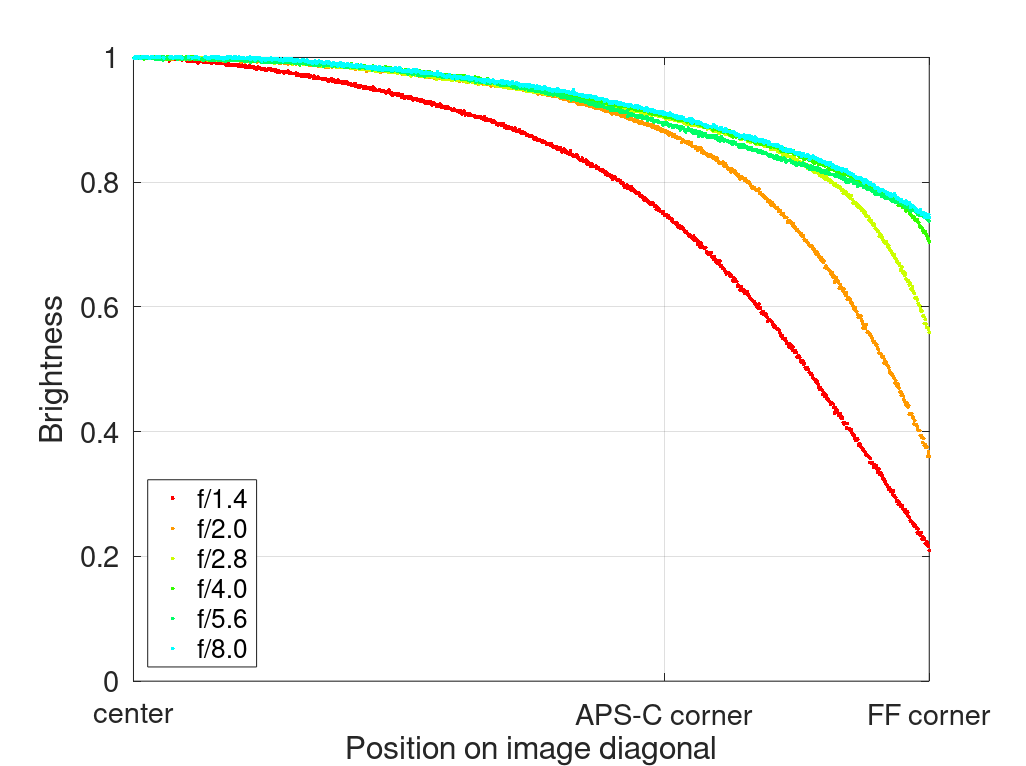
It is recommended to have a look at this article first to get an idea how this brightness graph works.
Luckily there is no color cast on A7rII and A7s, unlike with some other fast 35mm lenses.
Sharpness
infinity

Because the lens shows a slight focus shift I refocused every time I changed the aperture value. Wide open the lens is rather soft with quite some glow at these distances. The center improves quite a lot already at f/2.0 and reaches peak performance at f/4.0.
The midframe is another story, there is an area which is hit quite badly by field curvature and focus shifts differently compared to the center and corners.
The corners are mostly affected by astigmatism and coma not field curvature, so unlike many rangefinder lenses focusing for the corners will not really give better results here and only stopping down helps.
If you want best across frame performance best stick to f/11.
Compared to: Voigtlander VM 35mm 1.7 Ultron + 5m PCX Filter
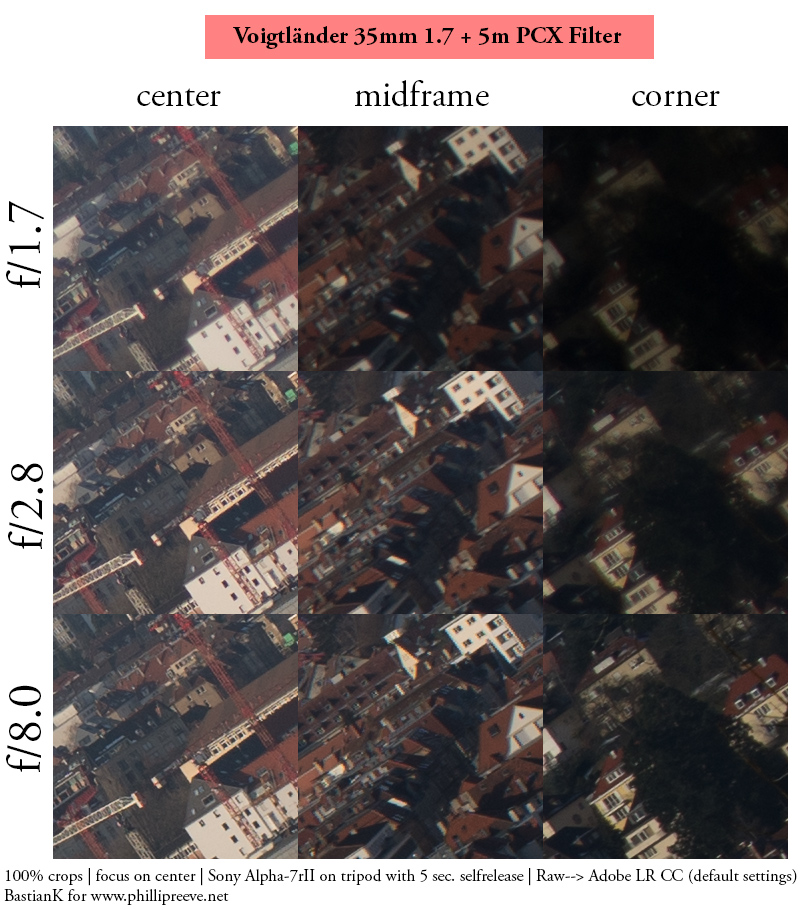
The Voigtlander VM 35mm 1.7 Ultron is a modern design which makes use of an aspherical lens element. If you are after across frame sharpness get this lens and a 5m PCX filter (see this article) to get rid of the field curvature introduced by the Sony filterstack. Volume and weight of the lens are similar and the performance is really impressive.
close (0.30m)
100% crops from center, A7rII
At minimum focus distance there is some “glow” (spherical aberration) wide open and at f/2.0. The image sharpens up at f/2.8 and gets really good at f/4.0.
There is noticeable focus shift (see section further below) and I refocused for every shot here.
Flare resistance
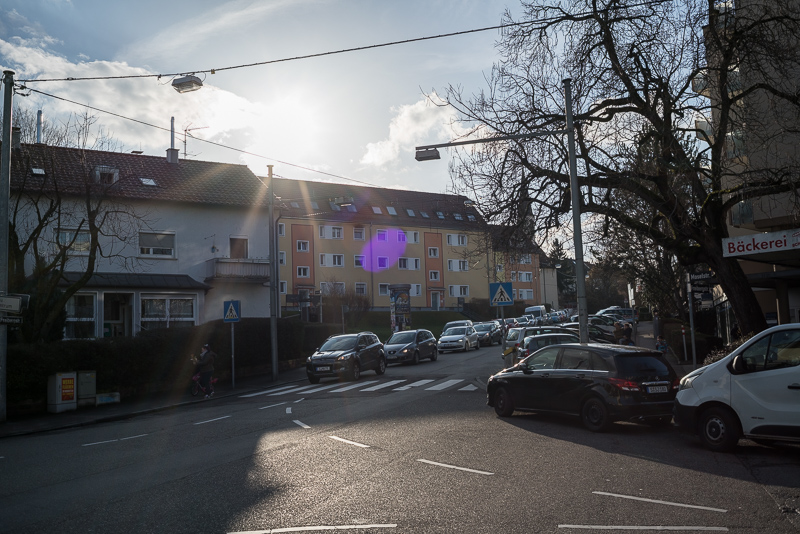
Flare resistance stopped down is really good. There is almost no loss of contrast and the colors still look great. In terms of ghosts I only managed to create one small purple blob.
Between f/1.4 and f/1.7 you can encounter results like the one below quite often though, with huge ghosts all over the frame.
Using the hood does not really help in these situations, but stopping down (already to f/2.0) does.
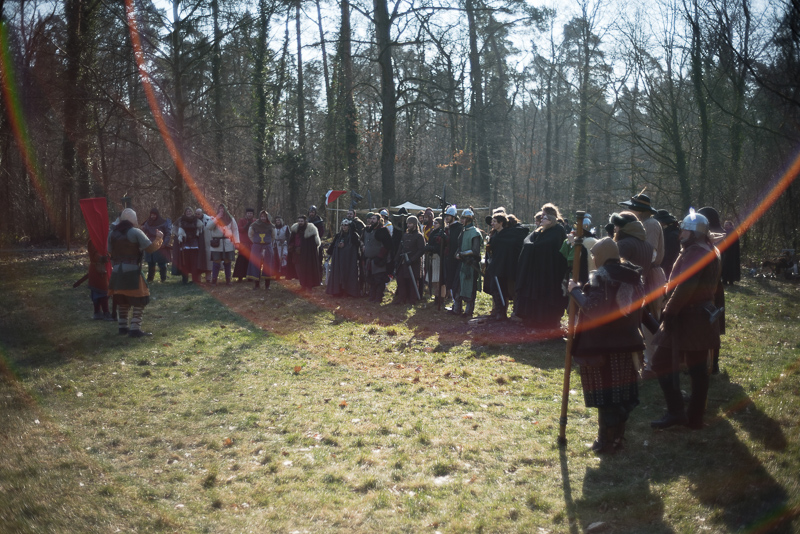
The hood is not necessary with the sun inside the frame stopped down (where performance is really good) and it does not help with the the huge red flares between f/1.4 and f/1.7. So you can leave it in the box and enjoy walking around with a smaller lens.
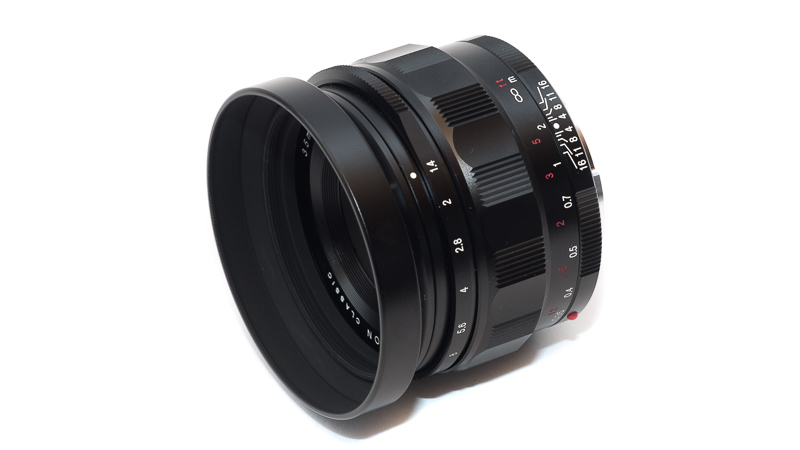
Coma
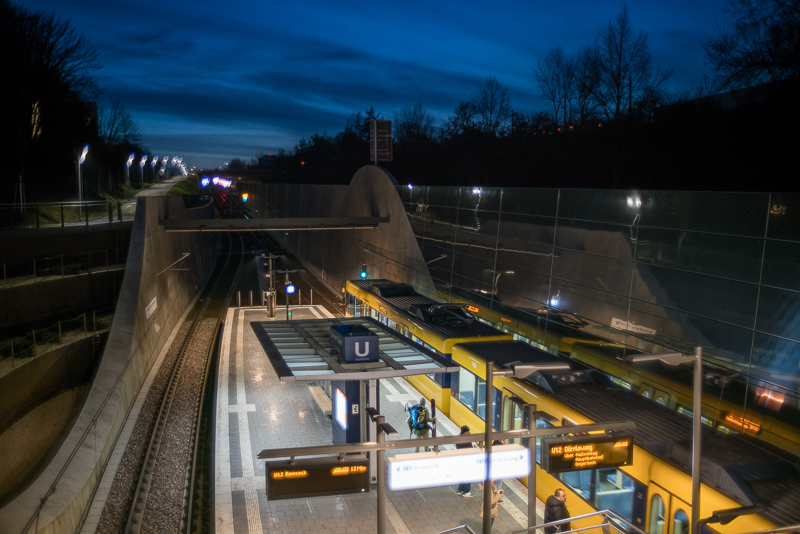
This is one of the worst performances I have ever seen. So far none of the small 35mm lens I have used were really good in this regard, but this is probably the worst. If you are into astrophotography and looking for a 35mm lens to use wide open stay far away from this one.
As a comparison I included a shot from the same scene taken with the Voigtlander VM 35mm 1.7 + 5m PCX filter. Wide open at f/1.7 the coma performance is comparable to the Nokton at f/4.0 and the sharpness to the Nokton at f/8.0.
100% crops from extreme corner, A7rII
Distortion
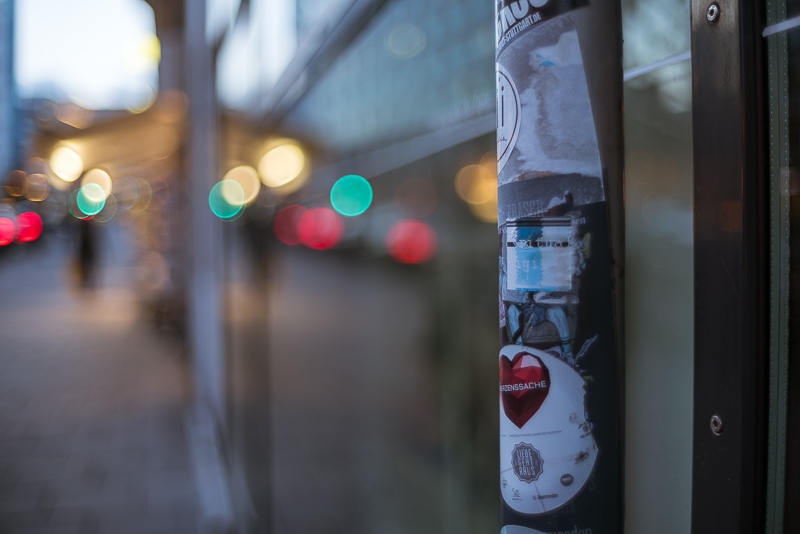
Distortion is pretty high for a 35mm lens. There is distinct barrel distortion which can be pretty obvious. Until the profile for this lens is available you can use the one for the M-mount version in Lightroom which is doing a good job.
Bokeh
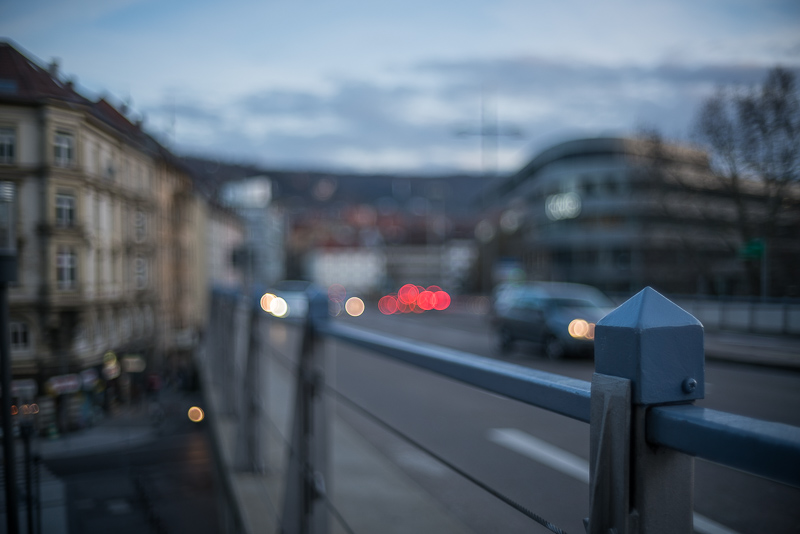
There is a classic in the name and it is there for a reason. If you are looking for smooth and creamy bokeh this lens is not for you.
The bokeh is very nervous in general and light discs are not evenly lit. When comparing it to the four other 35mm lenses in my 35mm comparison it is closest to the Loxia in terms of rendering.
Some people claim it improves on stopping down, I don’t really see that.
Of course some people like this rendering, the Jupiter-3 50mm 1.5 which is very similar has lots of fans as well, and in the end this is a matter of personal taste and you have to decide whether you want creamy or nervous. If you like nervous this might be just the lens for you.
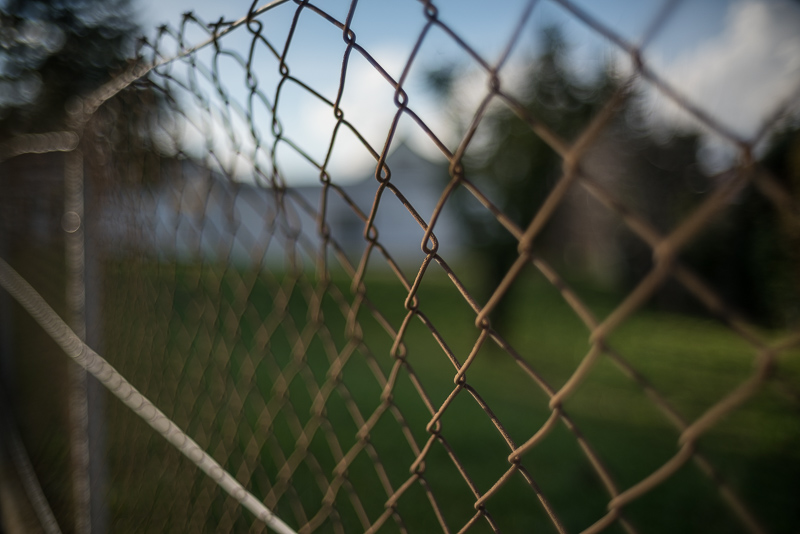
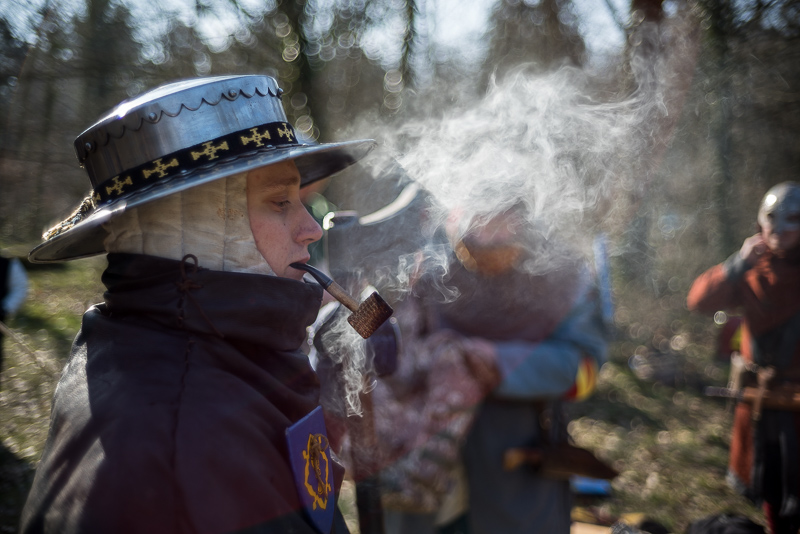
Another comparison to the Voigtlander VM 35mm 1.7 Ultron + 5m PCX filter. In this scene stopping down to f/2.8 helps to make the Nokton bokeh a little less nervous.
Sunstars
Beautiful 10-pointed sunstars as we are used to see from the Voigtlander lenses.
100% crops from midframe, A7rII
Chromatic aberration
lateral
There is an embedded profile which corrects for lateral CA which cannot be easily disabled and does a very good job. I still checked by taking a few shots without electronic contact between camera and lens and could still barely find any lateral CA, which seems to be typical for almost perfectly symmetrical designs.
longitudinal
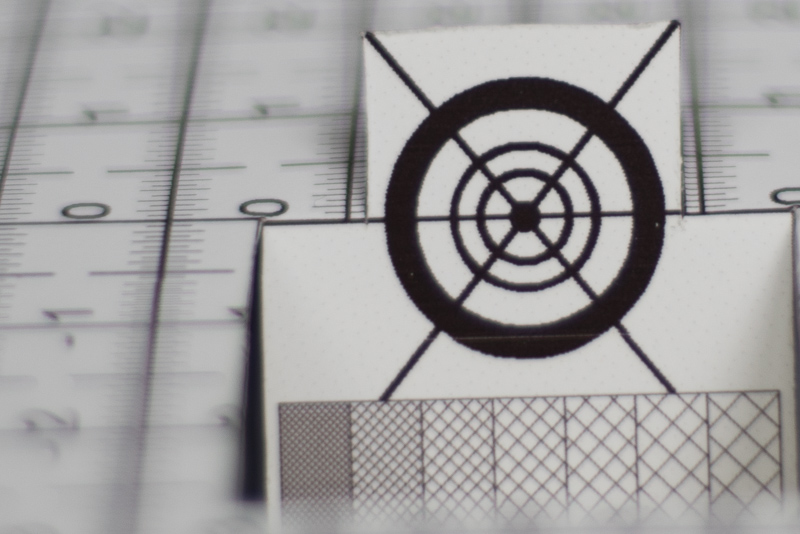
There is a bit green behind and magenta in front of the focal plane visible but at the minimum focus distance the problem is somewhat masked by spherical aberration when shooting with wider apertures. But when focusing at something a bit farther away in high contrast scenes like the one below the problem can be easily visible:
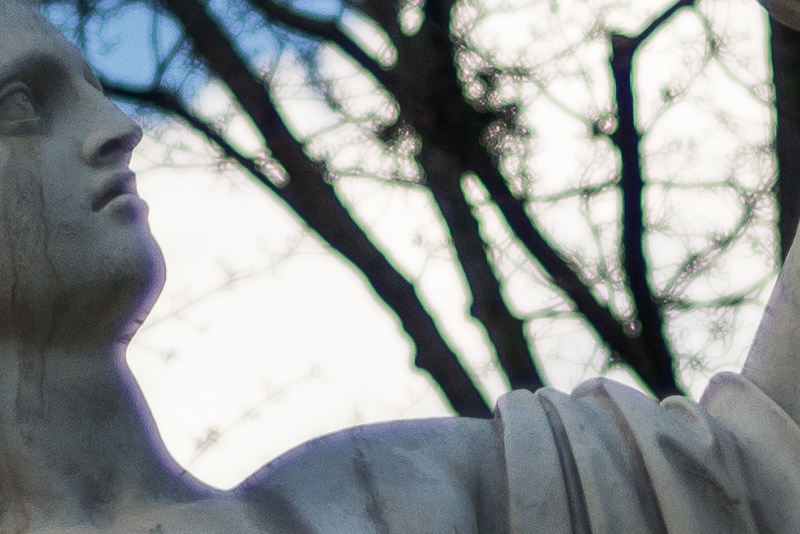
When you stop down to f/4.0 the color fringing is mostly gone.
Focus shift
50% crops, A7rII
When stopping down the plane of optimal focus shifts to the back, so you have to focus a bit closer for best performance. I recommend focusing at working aperture with this lens to get best results.
Alternatives
Zeiss Loxia 35mm 2.0:
This lens is also based on an older rangefinder design. Bokeh is also not that smooth (still smoother and quite good in close up scenarios at least) and corner as well as coma performance at f/2.0 to f/2.8 isn’t great either. Still, almost no distortion and a really great landscape and architecture lens at f/8.0.
If you are looking for a compact 35mm lens with mainly stopped down shooting in mind I think this is the better choice, get a used one as new they are a bit too expensive.
Voigtlander Ultron 1.7/35:
A very good performer for a decent price. By giving up half a stop of speed you get a modern lens which is a great performer and offers the smoothest bokeh of all small 35mm lenses. If you want to make the best of it on your Sony camera get an Optosigma 5m PCX filter.
Voigtlander Nokton 1.2/40 E:
This is the modern interpretation of very fast yet still decently compact wide angle lens. While it isn’t a perfect lens I think it is optically better in every regard.
Zeiss ZM 35mm 1.4 T* Distagon:
This is Zeiss’ most recent rangefinder lens and while there is so much to like it also suffers from midzone dip on the Sony cameras.
Sony/Zeiss FE 35mm 2.8 ZA:
If you are looking for a compact 35mm lens this might be worth a look. While 2 stops slower it is less than half the weight, you don’t have to stop down to f/11 for decent across frame sharpness and you get AF.
Sony Zeiss Distagon 1.4/35 ZA T* FE/Samyang 35mm 1.4 AF:
I still haven’t laid my hands on one of these yet. They are heavy and huge, so If you are looking at this lens you are probably not interested in these.
Older manual 35 mm lenses:
There are simply too much options here to cover them all but in case you can get by with a slower and bigger lens you may start taking a look at our Canon FD 35 mm comparison.
Conclusion
good
|
average
|
not good
|
With the “classic” in the name and based on what I have seen from the M-mount version my expectations were rather low. As it seems so far for good reasons: this lens is in noy way comparable to modern designs like the Zeiss ZM 35mm 1.4 or the Voigtlander Ultron 35mm 1.7. Sharpness wide open is anything but great, corners never reach the quality of most other primes and many aberrations like Coma or Astigmatism and even distortion are not well corrected.
This lens is really for people who like the rendering with the nervous bokeh and also the glow wide open, but still want to enjoy some modern features like Exif data and decent coatings or do not want to get into adapting legacy lenses.
If that is not you there are probably better lenses for you that I listed in the Alternatives section, especially the Voigtlander VM 35mm 1.7 Ultron + 5m PCX filter which is a bit longer but also thinner and only marginally heavier.
New this lens costs as much as $799/749€. You can find it at CameraQuest, B&H, on amazon.com/amazon.de and also on ebay.com/ebay.de (affiliate links).
Sample Images
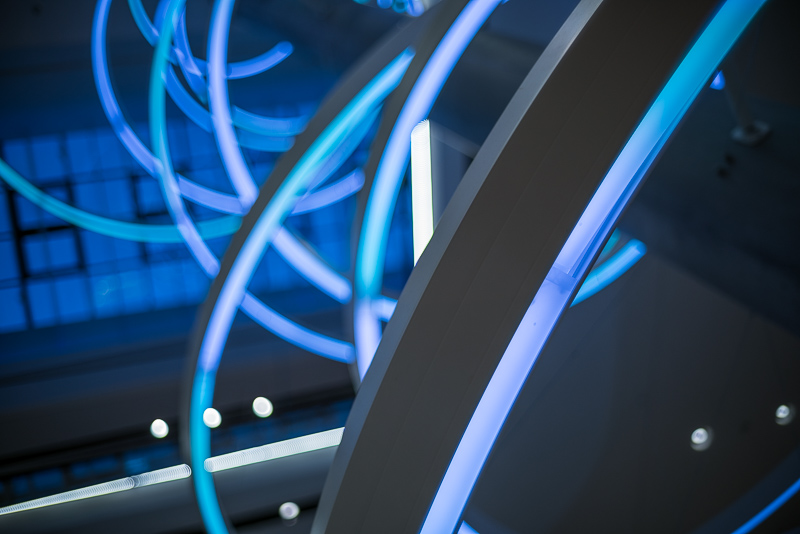
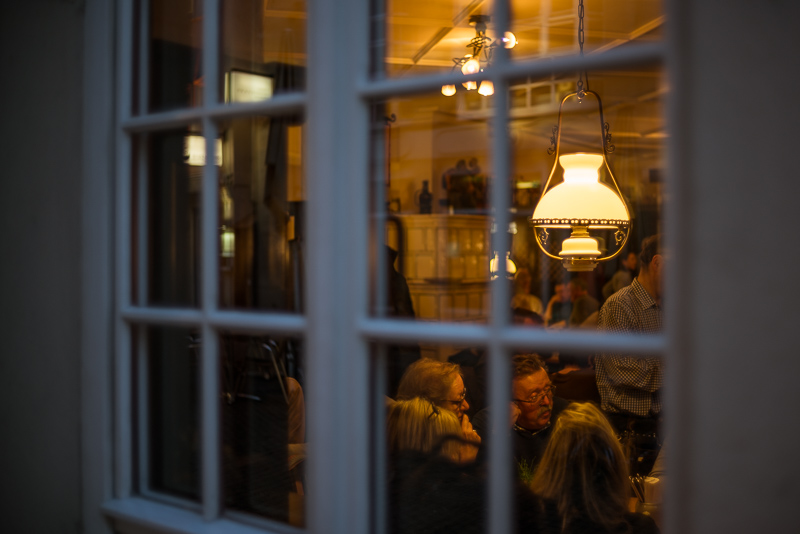
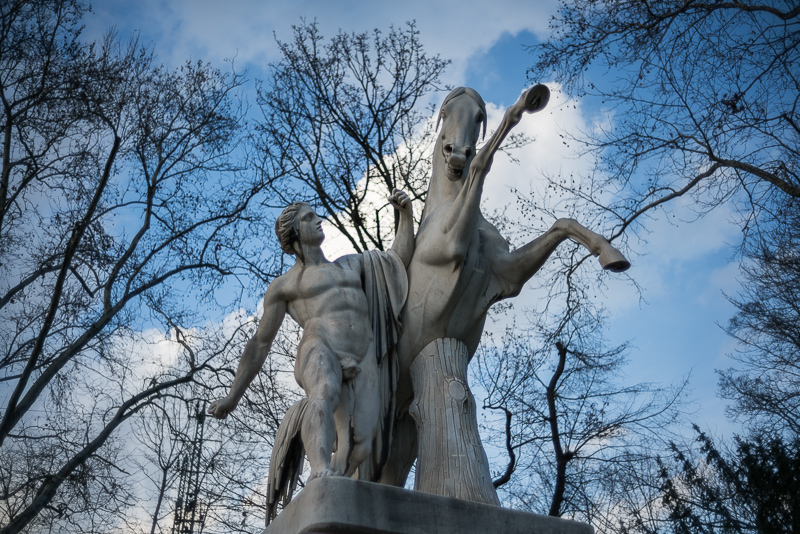
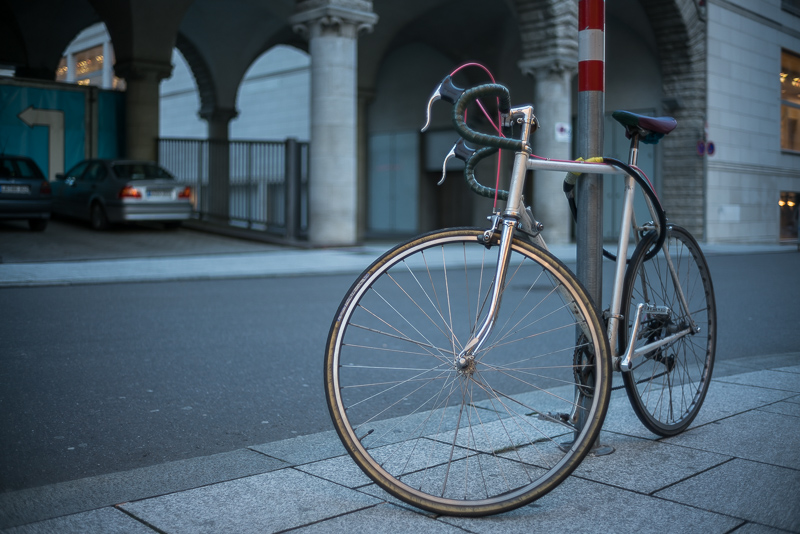
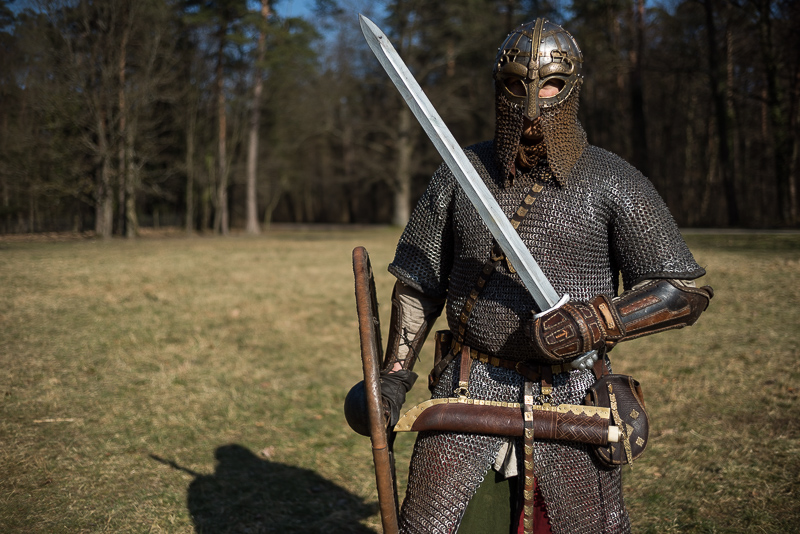
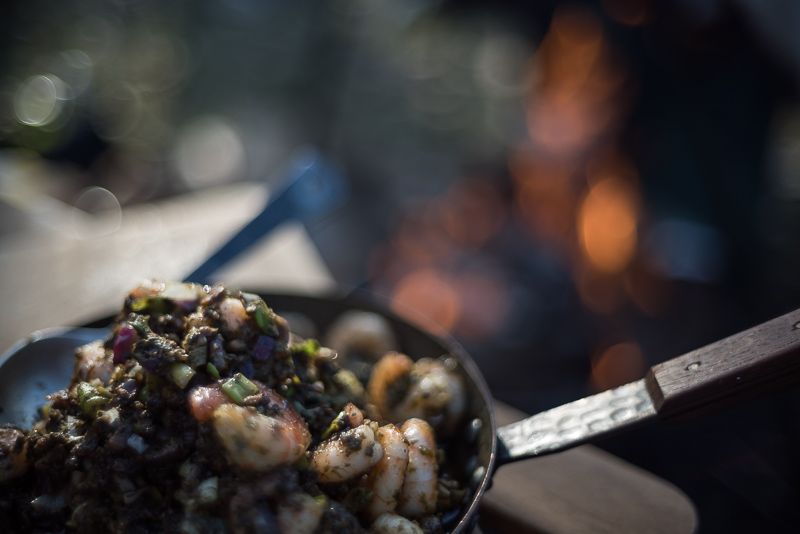
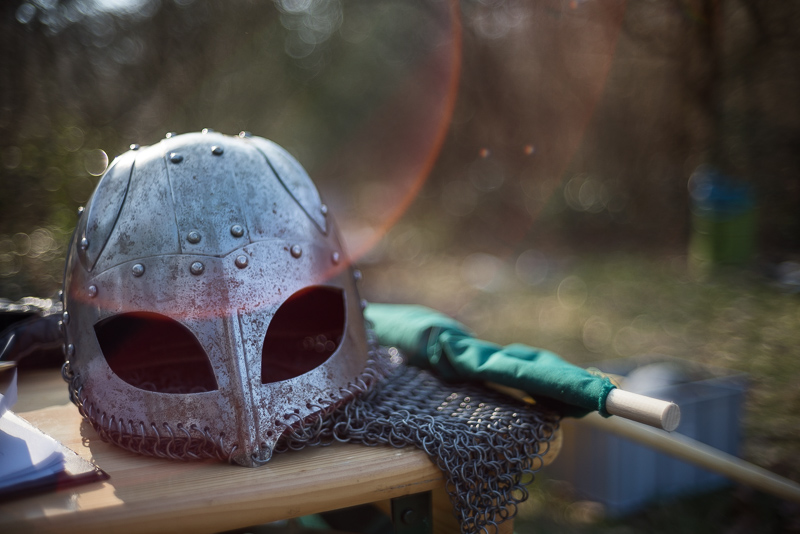
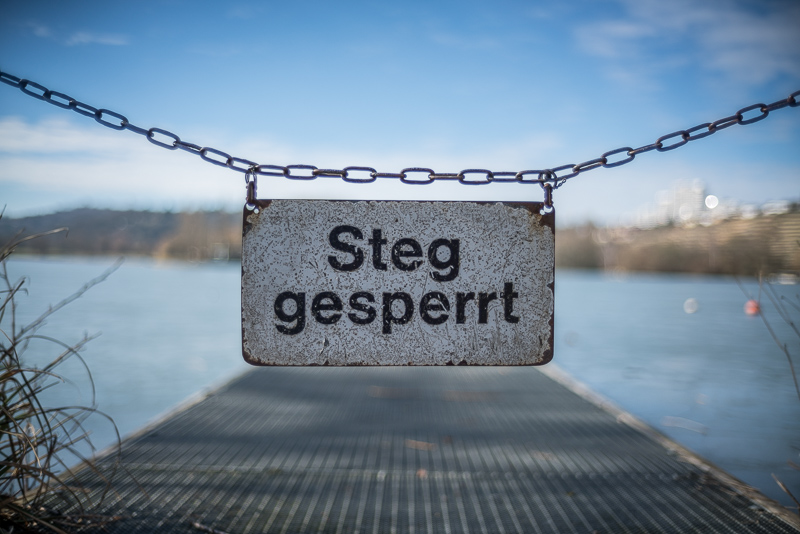
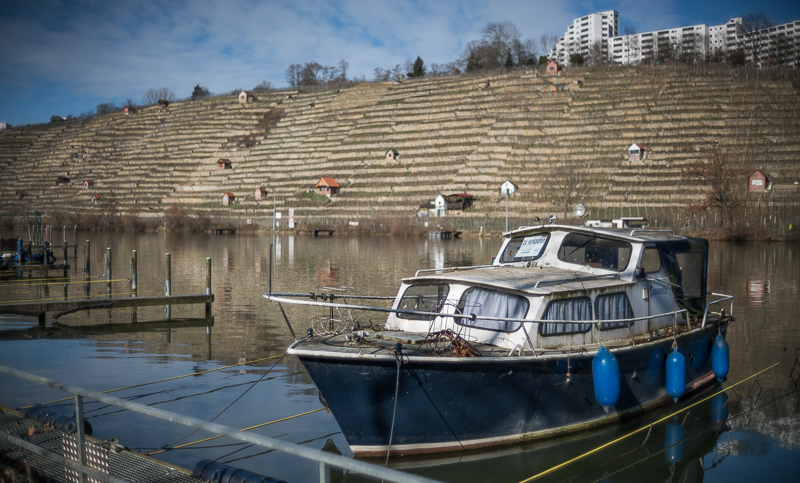
Most of the sample images in this review can be found in full resolution here.
Further Reading
- Sony FE lenses: Our comprehensive and independent guide
- Voigtlander 35mm 1.7 Ultron Review
- Voigtlander 40mm 1.2 Nokton Review
- Tripods for mirrorless cameras
Support Us
Did you find this article useful or just liked reading it? Treat us to a coffee!
![]()
![]()
![]() via Paypal
via Paypal
This site contains affiliate links. If you make a purchase using any of the links marked as affiliate links, I may receive a small commission at no additional cost to you. This helps support the creation of future content.
Latest posts by BastianK (see all)
- Review: Thypoch 21mm 1.4 Simera - July 12, 2025
- Review: SLRmagic 50mm 0.95 Hyperprime LM - July 5, 2025
- Full Resolution Pictures getting fixed - July 4, 2025
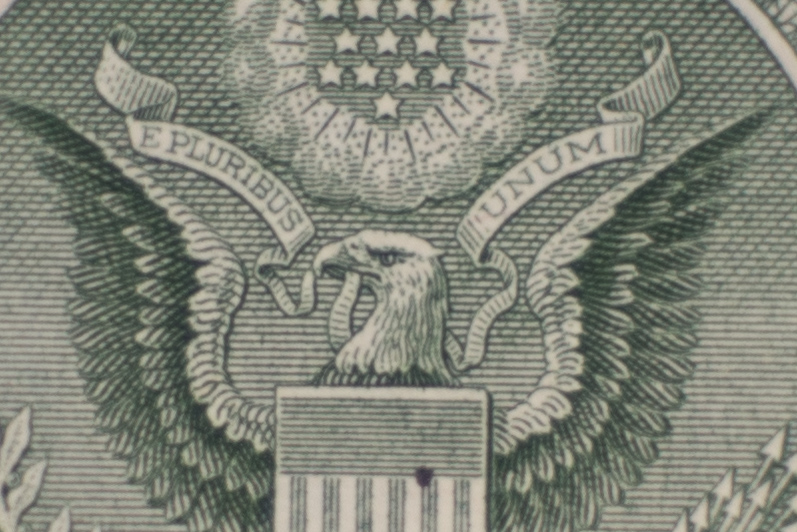
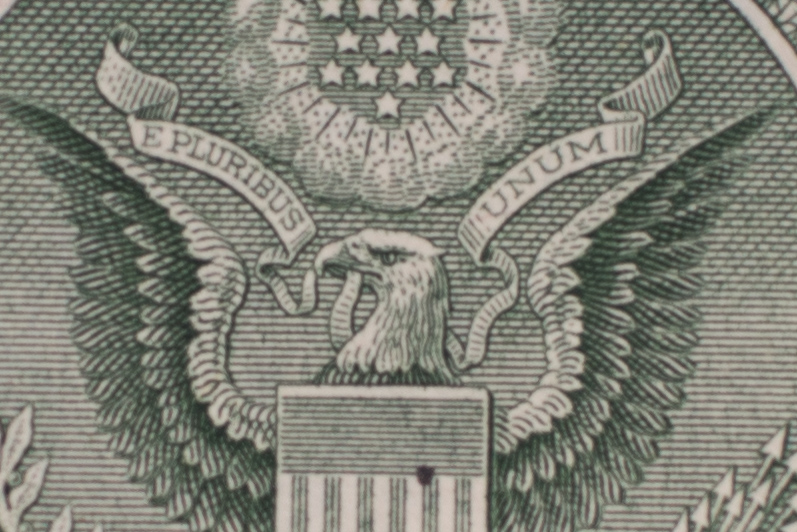
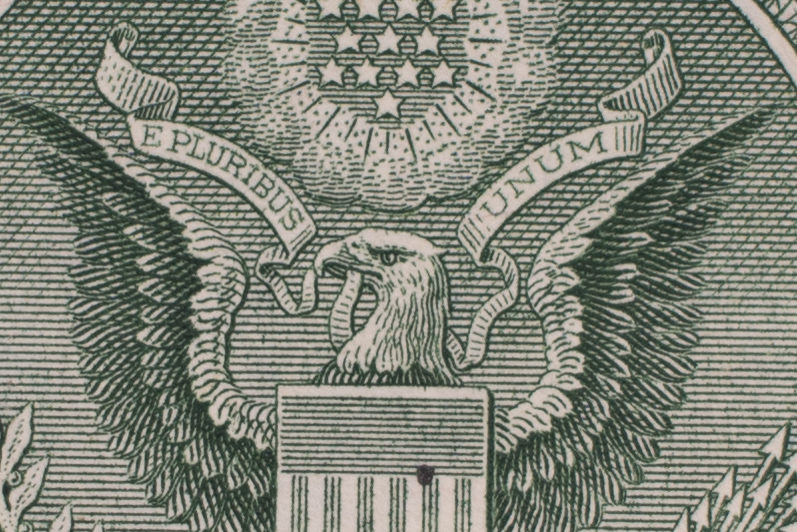
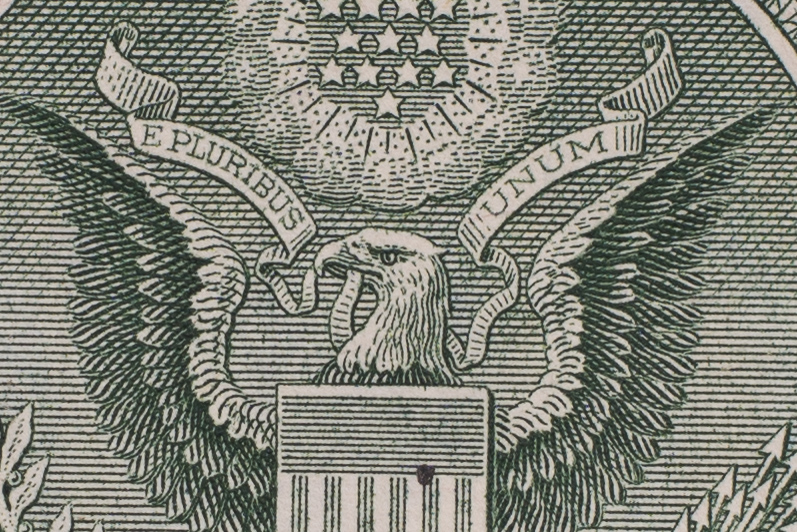
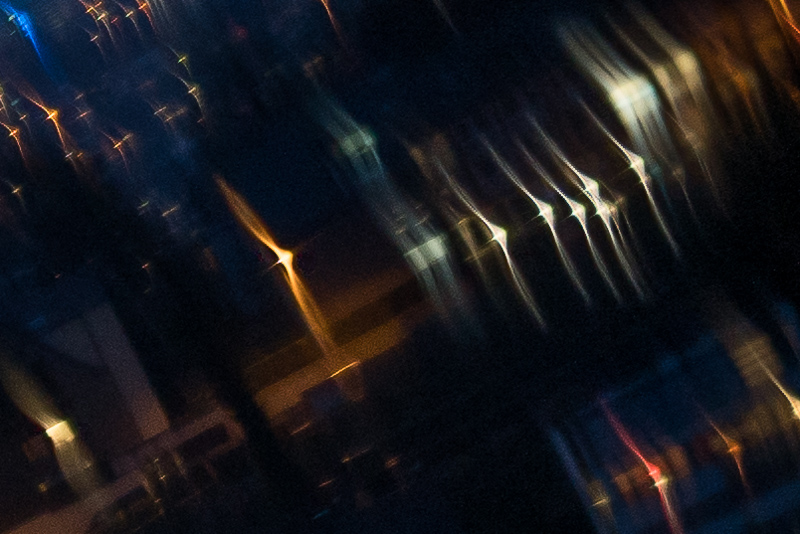
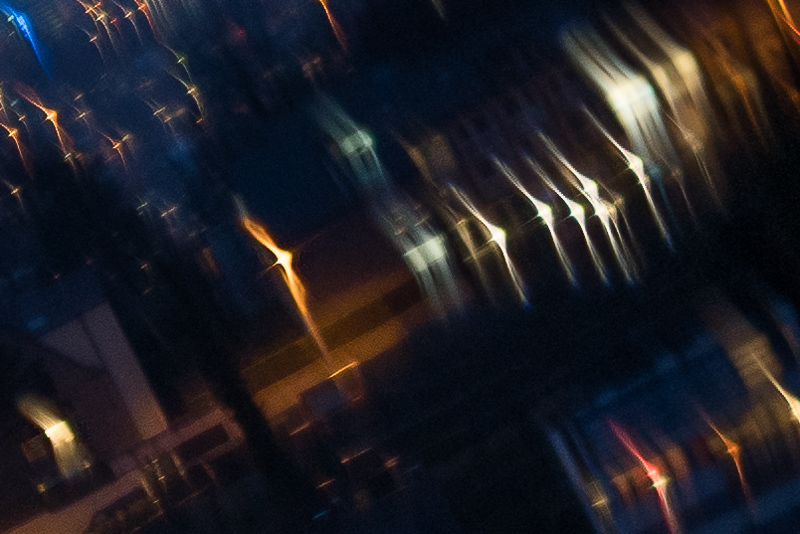
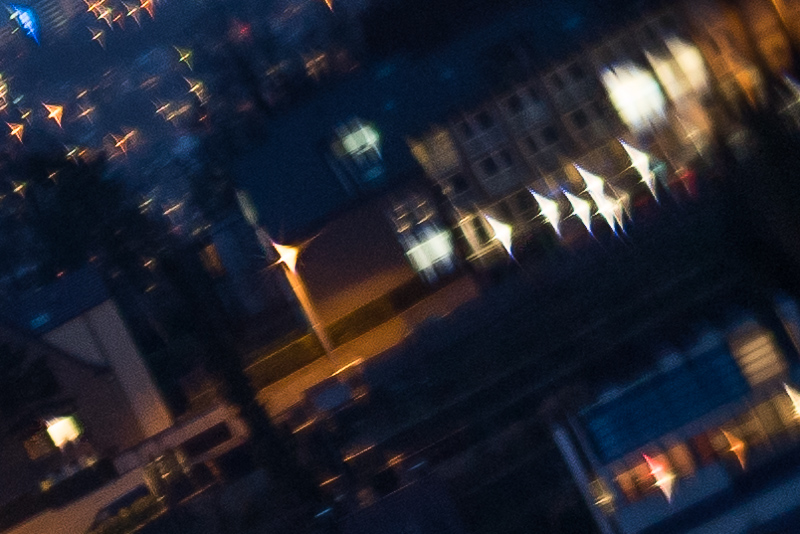
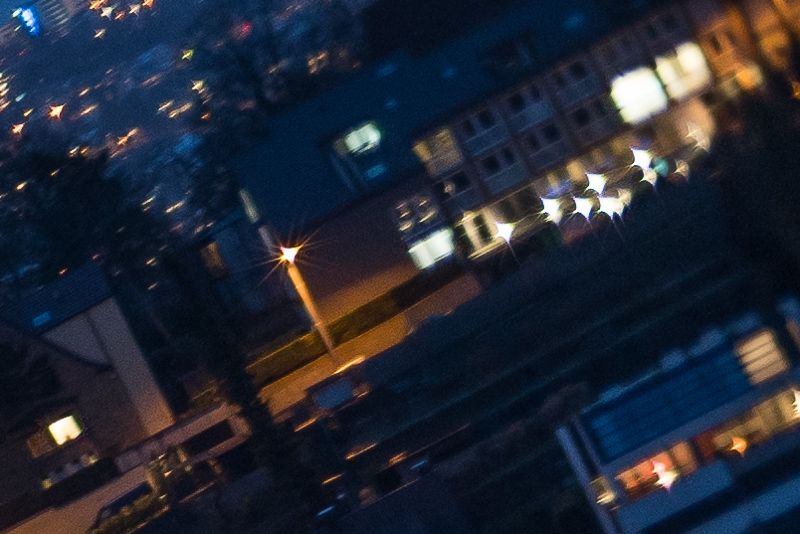
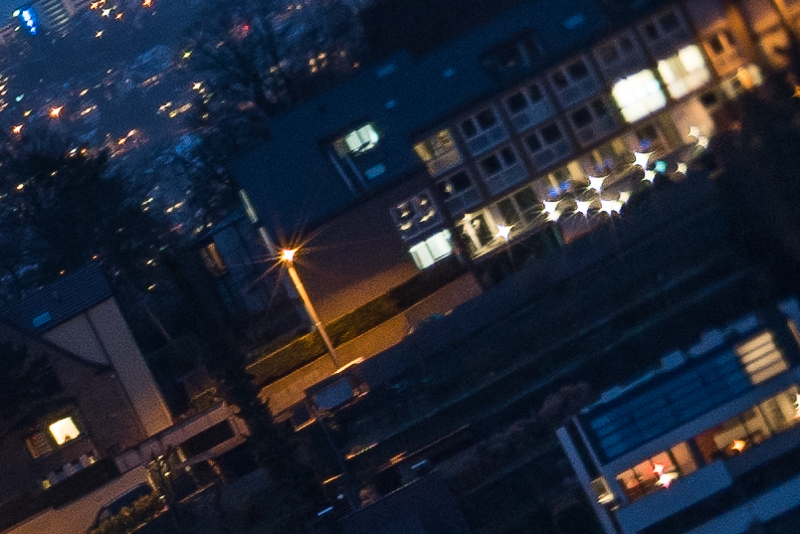
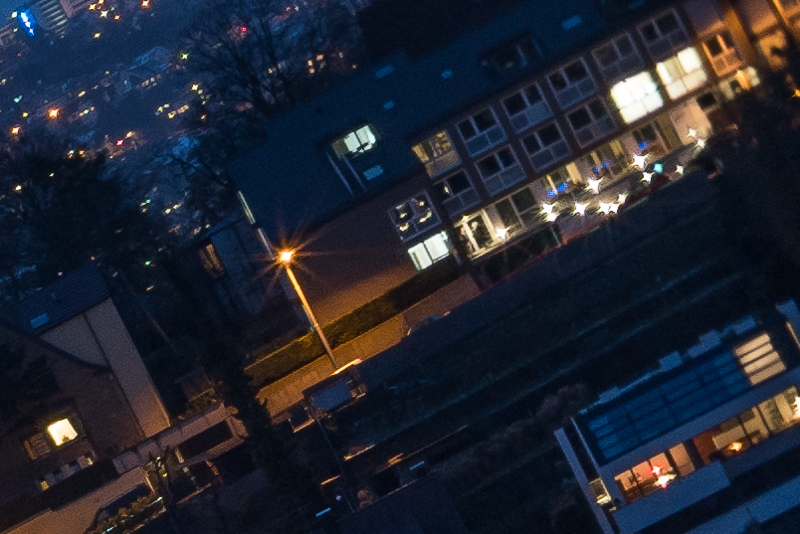
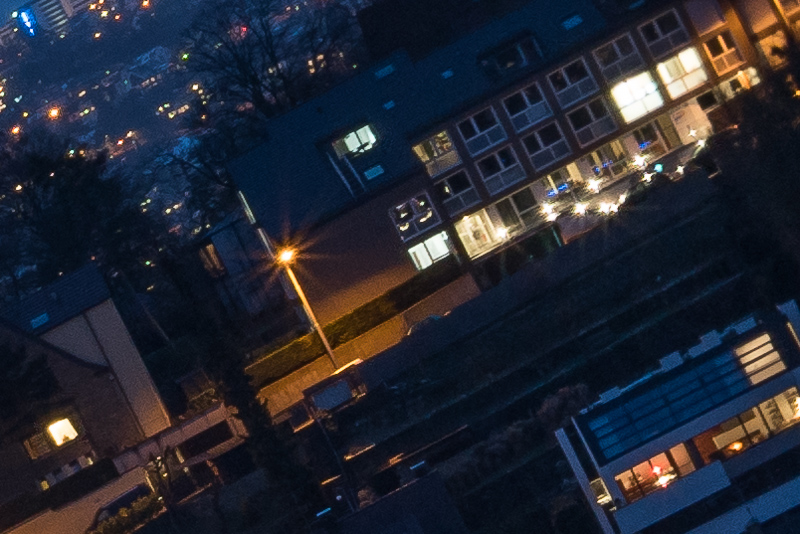
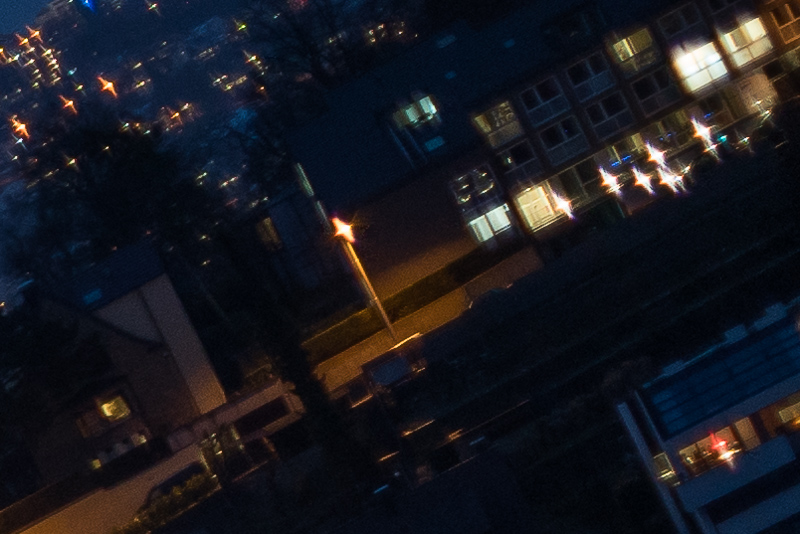
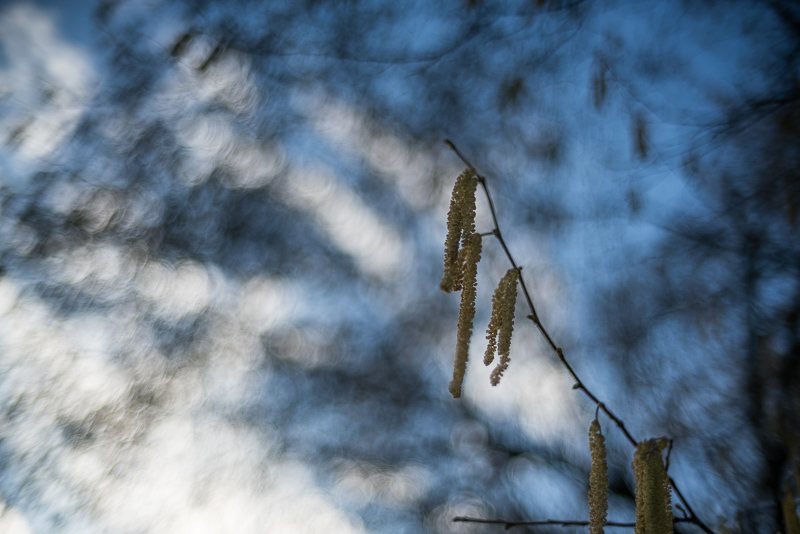
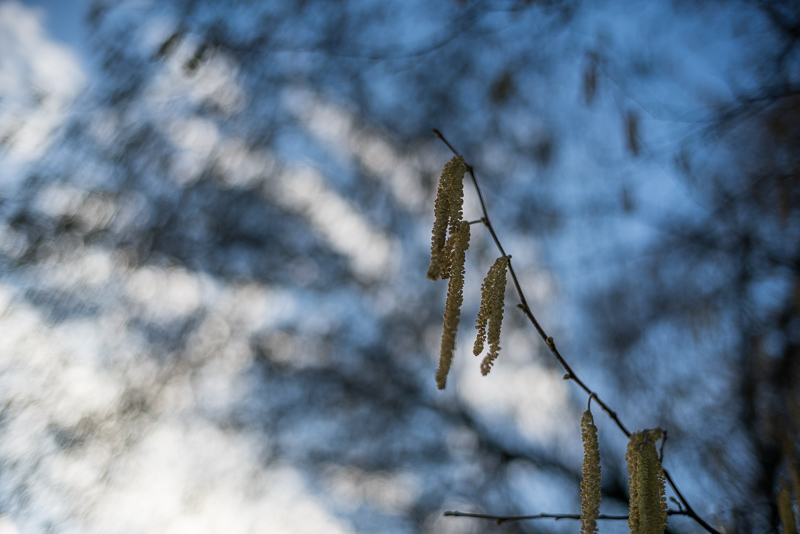


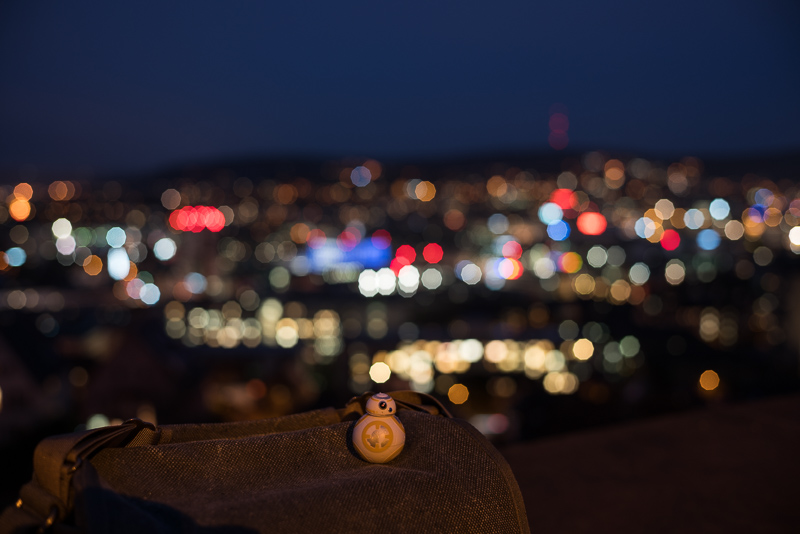
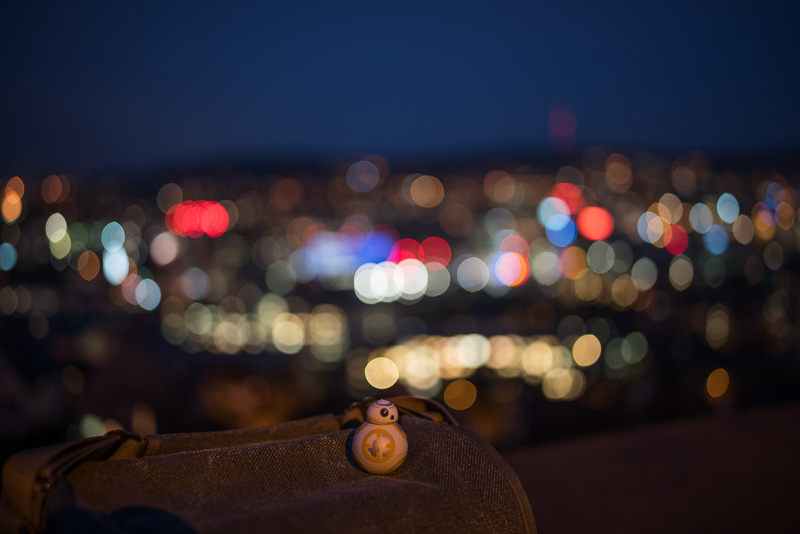
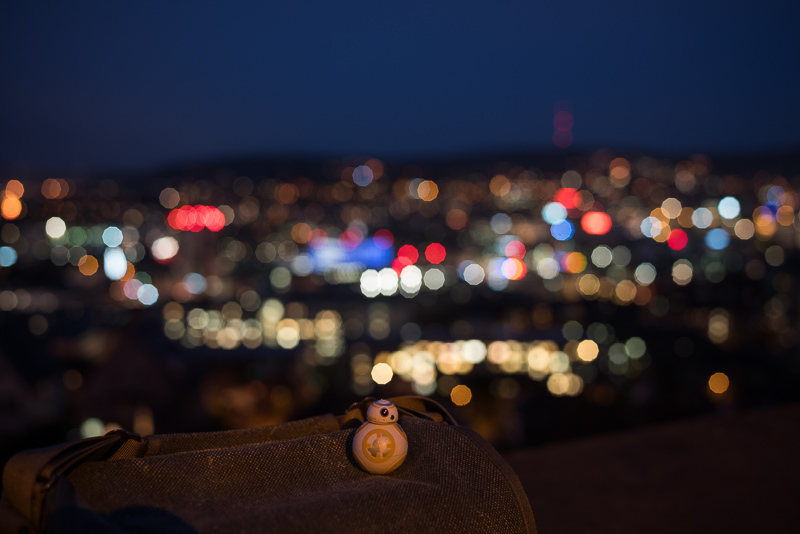
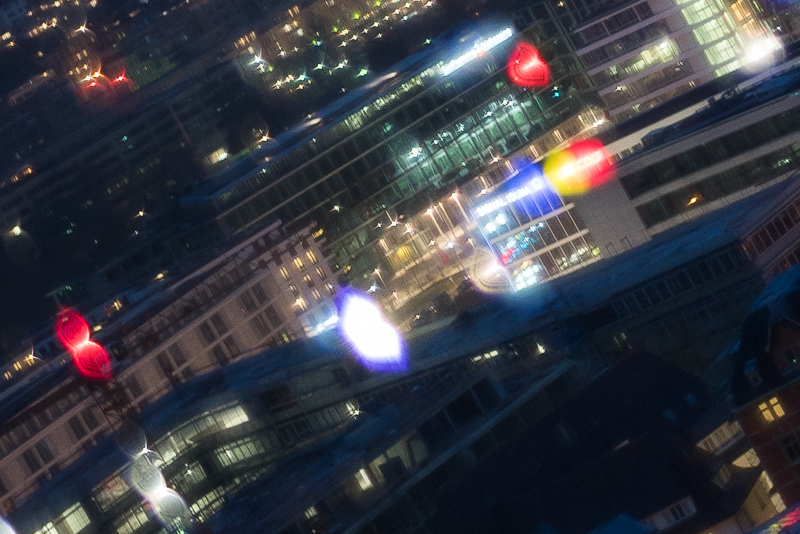
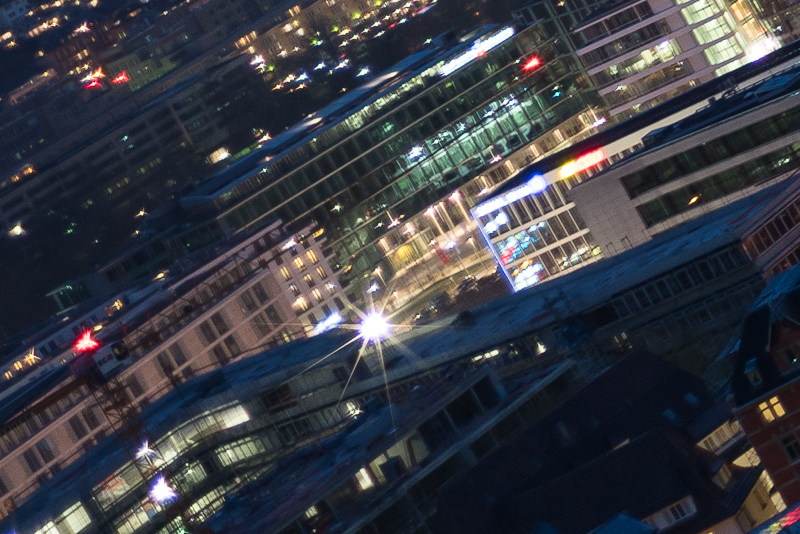
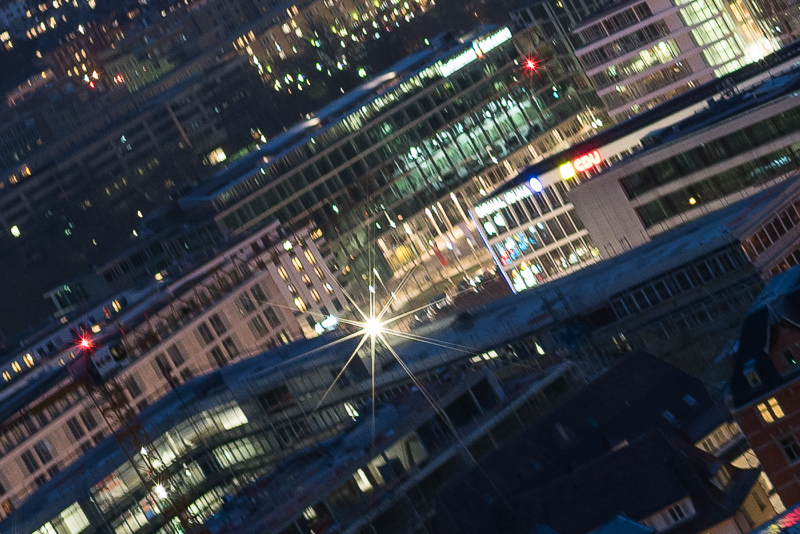
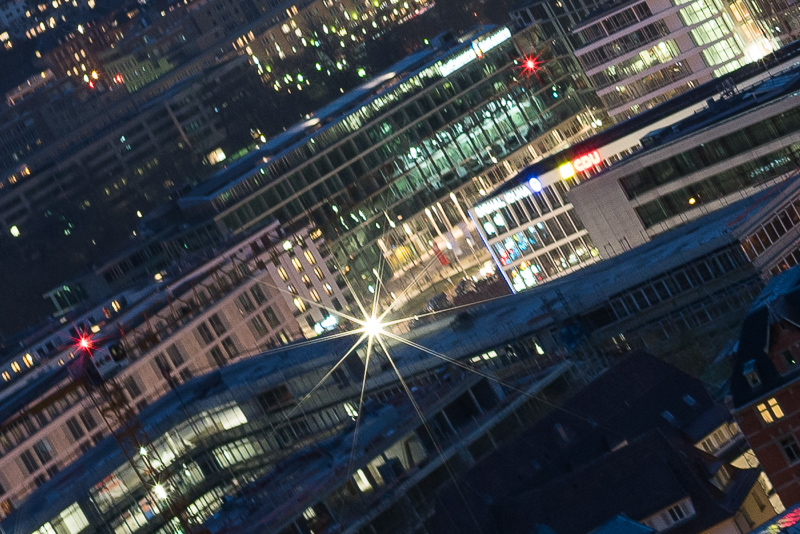
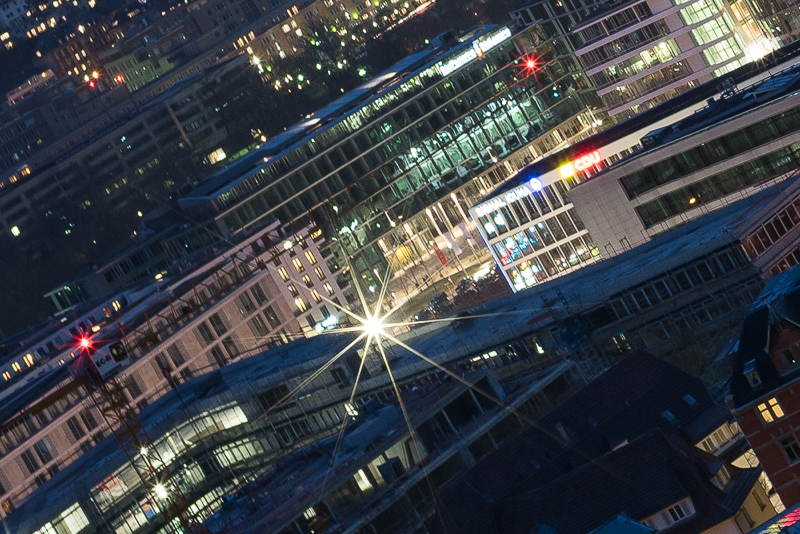
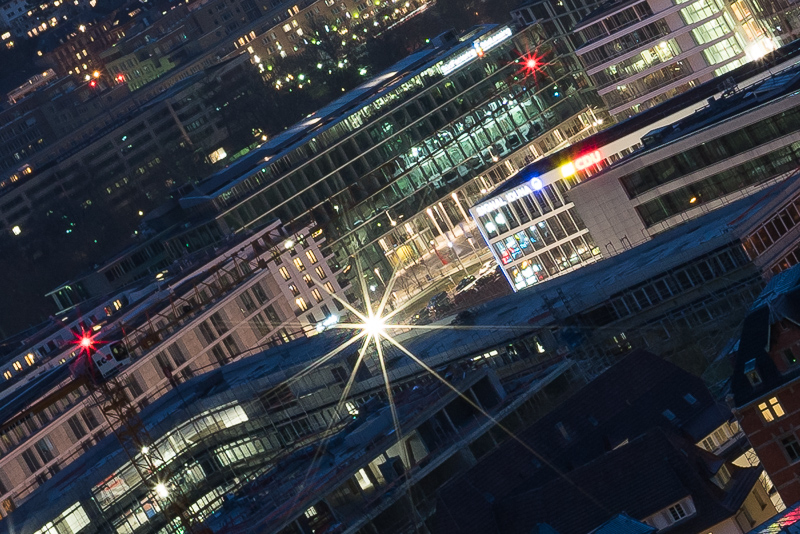
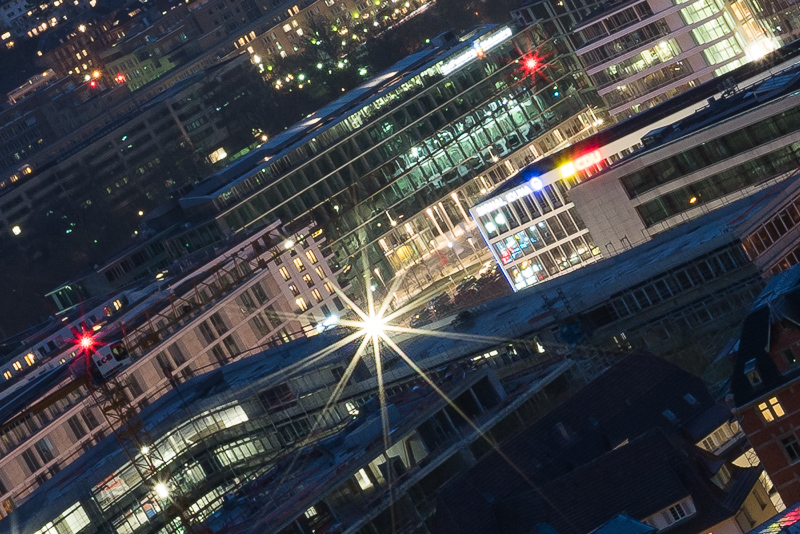
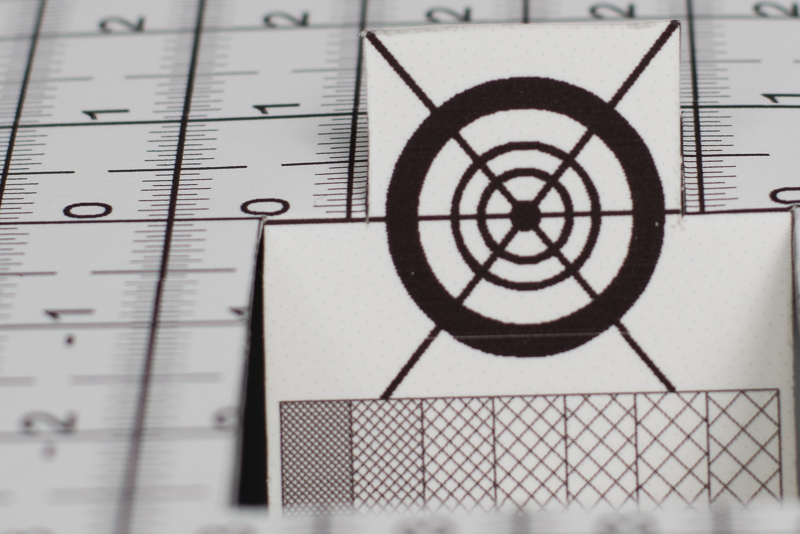
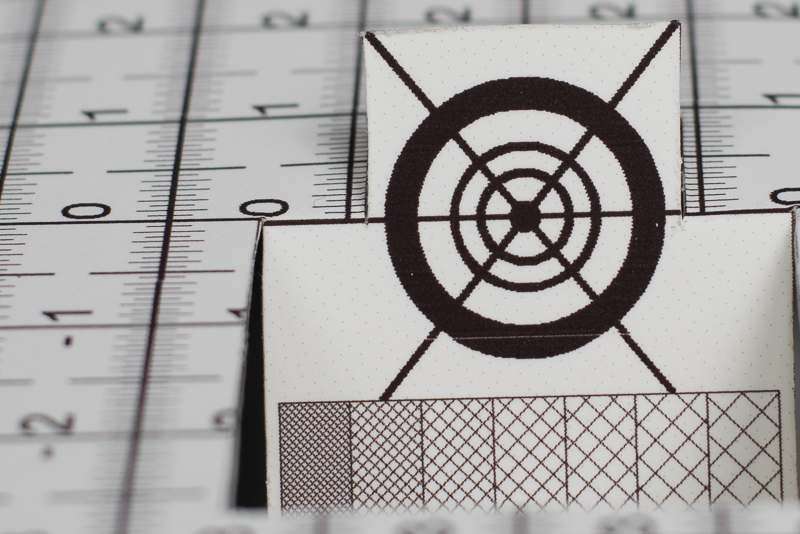
Thanks so much for this Bastian.
I queried the only Swedish retailer to list it (as a future product) yet whether they’d import from Nippon or wait for the euro release and they’d wait.
This lens seemed so promising, I could have lived with a rather soft look at f/1,4 and sharp corner to corner at f/8 for a small super nicely built mf lens; can however not live with that bokeh. I dislike clinical stf-bokeh and too nervous and this is a class of nervous that does not appeal one bit.
Original M-mount Voigtlanders 35/1.4 and 40/1.4 also have terrible bokeh, even worse coma and overall are garbage lenses. Performance of this lens should not be surprising.
Am not familiar with those and wasn’t sure what the marketing speech about “optimized optical design” would mean. ” You can enjoy soft delicate descriptions reminiscent of classic lenses with stable image quality.” seemed to promise at least okay bokeh, if not astro performance.
Thank you for the nice review! Interesting, how much new lens optically differ with m-mount version and Voightlander 40/1.4!
I like very much my 40 1.4 on the Sony A7 , It has beautiful colours and contrast. It is sharp enough and even in the corners if you stopped down.
Can someone not make a fast 35mm that will work for astro and not break the bank? This is such a disappointment.
Try Voigtlander 35mm 1.7 + 5m PCX filter which I have already used for astro. Should not be much more expensive than the 35mm 1.4 classic.
Given that you are using a tripod anyway, the size and weight of the Sigma Art should not be a problem. It’s quite usable for astro even wide open – good sharpness and very little coma. Costs about the same as the Voigtländer.
Looks nice on the camera at least. Looks like it was made for the Sony A7.
Seems like better buy smc takumar 35mm
If you like the look of this kind of old school symmetrical wide, then at least this one has great flare and contrast control. Real classic lenses tend not to: including the smc takumar (though it was great in this regard for its era)
Performs exactly like a 1970s lens. Awful, awful…
Not exactly. Flare and contrast are much better.
Thanks for the review.
Today i wanted to drive to my seller and look for one, but your review was faster. Thats sad.
I want only a little mf prime in for travel. Apparently there is nothing comparable in this size.
The Voigtlander 35mm 1.7 is slightly longer but the volume is the same or less.
I bought this yesterday – keen to test it out on photos of people – my sigma 35 was damaged, so this will be it’s replacement.
There seems to be a reason why all the latest 35/1.4 wonder lenses from Zeiss, Canon, Sony, Nikon and Sigma are the size they are. OK, the 35/1.7 Ultron and ZM 35/1.4 leave some hope for a more compact manual focus FE option. Perhaps Voigtlander felt the 35/1.7 would be positioned too similarly to the new 40/1.2? Hence this lens in the opposite direction?
IMO it’s totally unrealistic to expect anything technically amazing from this optical design. That said, from other online samples I’ve seen of it at f/8, it’s better than I expected. Only the extreme corners are noticeably soft. Where it seems to suffer against modern designs, once stopped down a bit, is a general lack of micro contrast. IMO, it lives up to what I consider the ‘classical’ Voigtlander look from years prior to their latest and greatest.
FWIW, I generally like its overall rendering in the images I’ve seen so far, when viewing a given image in its entirety, rather than zooming in to pixel level. To me it’s ‘interesting’ and a bit of eye-candy for certain types of scenes where perfectly smooth Gaussian blur would otherwise be rather generic.
I totally agree this lens is not up to par. I am sending mine back.
Thia lens probably work better in a A7s as they have different sensors
It won’t.
Probably the 35 with the worst rendering character I have ever seen.
Instead, the CV 35/1.2 is awesome, and wide open you get a Noctiluxish rendering.
Poor lens. But the photo with a helmet looks really cool:)
Ha. I thought the same thing.
Waiting for your comparison on the FE35mm f1.4 /Samyang/ and may be the sigma.
Thanks for this review. I’ve been using the Voigtländer Nokton 35mm MC classic (bought in 2014) for several years now. It’s high built standard, very compact, not that heavy and makes the Sony A 7 / A 6000 pocket-friendly. That’s why I bought it. An enthusiasm for this lens has not set with me.
The new edition 2018 with the suffix “E” seems to be identical to the structure (8-Lens). The update seems to refer to the minimum focusing distance (0.3m instead of 1m) the Exif data transmission and the E-Mount compatability. By the way, I recognize on the test recordings exactly the old ME Classic with its weaknesses again (incl. Focus shift while stopping down, CA’s and bokeh). This former lens has not been tested by you. But if you do, I ‘d guess with exactly the same results.
I think so too, that is why I am barely interested in trying out the M-mount one.
I just purchased the m-mount version. I’m planning to do a comparison between it shooting film in an M3 v. shooting digital in the a7R3. Along with that I recently got my first Nikon (ever – after 50+ years) which came with the Nikon e-series 36-72 zoom. I purchased an old Nikkor 35/2 which I’ll through into the mix along with the cheapest 35mm FF the Pergear 35/1.4 e-mount. Three 35’s on 3 bodies film and digital 1 body with 2 lenses. 1 lens on 2 bodies. This comparison won’t even approach yours but it’s to satisfy my own curiosity.
Hello BastianK,
Wonderful review, many thanks!
I have very recently switched from Nikon DSLR to Sony mirrorless (A7Rii), enjoying the camera thoroughly. I am currently looking at my option for a prime lens for street photography and landscapes. So far i have been attracted by the Zeiss Batis 25mm F/2, Sony Zeiss 35mm F/2.8 and Voigtlander 35mm 1.4 Nokton E.
Can you please advise, if i had to choose one out of these 3 lenses which lens would be apt for my Sony A7Rii for street and landscape photography.
Looking forward for your response. Thank you!
P.S: i am a hobby photographer.
Instagram: theonlyoneatif
I am not the biggest fan of the bokeh of the Voigtlander 35mm 1.4 Nokton E and on your IG account I don’t really see pictures that would benefit from it.
I would rather recommend the Voigtlander 40mm 1.2 E.
The Batis, depending on whether you want to buy new or used, I find hard to recommend now that the Sony FE 24mm 1.4 Gm is available.
Thanks a lot!
Hi Bastian!
found a little typo:
[…] (where *perfromance* is really good) and it does not help with the the huge red flares between f/1.4 and f/1.7
Thanks for the really good article!
Fixed, thanks!
How is VC 35 /1.4 Classic M-mount + 5m PCX compared to this ???
There is even a comparison is this review.
Thanks for this review of actual performance and your thoughts on the matter, particularly the idea of these older lens designs on newer digital cameras.
I have a Sigma SD10 (a camera from 2004) and an SDQuattro, and the 30MM f1.4 Art “kit” lens. I also have a 28mm Takumar f3.5 lens that I have used, quite happily, on the SD10.
Some years ago (14 years, maybe?) I had a Voigtlander (film) rangefinder and the 17MM Ultron. I consider that lens to be simply superb.
But when I use the 28 Takumar on the sdQ, it just doesn’t seem right. The 30mm Art is just so much better, in almost every way, except perhaps in size. Now I will say that the tonality and rendering of the SD10 is quite different from the Quattro…But the high resolution of the Q sensor (and possibly the Sony and other new cameras) simply does not, in my view, mesh well with the older lenses on a practical level and the new sensors expose every defect in those older lenses.
It’s kind of a shame, but there you are.
I could see the 1.7 Ultron on the sdQ as a possibility, but the 17-50 f2.8 zoom is very good, and the 30 is very close to the 35mm of the Ultron, so why bother? In the end it is either one more thing to carry or you have to plan to shoot a certain style of image.
If you find the “character” of this lens so bad, I’d be interested to learn what you think about the NEW 35 /1.8FE lens
Phillip already reviewed the Sony FE 35mm 1.8. I share his opinion.
The bokeh ruins the lens for me. Simple backgrounds look fine, and I liked the image rendering in many of your sample photos.
Any time there is a busy background, I see the nervous bokeh and I’m not a fan.
Ruins it for me too.
I am speechless…. i am not very big fan of clinically sharp images and smooth bokehs that can’t “tell” the story, BUT…
Guys, i will NEVER EVER buy again something from voightlander… EVER!! This “lens” is the worst “lens” i’ve ever seen in my life! It fails EVERYWHERE… Catastrophically!!!! I hate it so much, that i don’t have the words of describing how exactly i hate this “lens”
Do NOT make the mistake of buying this “lens” or ANYTHING made from voightlander! AVOID!
I understand that you hate this lens, but this is not what other Voigtländer lenses are like.
I’m a bit surprised that the lens causes so much hate. Sure it sucks if you want perfect optical performance, but I did not expect that was the goal for everyone. It certainly isn’t to me.
I’ve had this lens for many years and I love it. It’s a complement to my other lenses (and my other system). I use it when I want quirky performance and/or an as small lens as possible, that is still very sharp stopped down.
To enjoy the Nokton, you have to work _with_ it, not against it. Which means you have to find scenes where the chaotic bokeh adds something. You can’t shoot wide open and expect the background to be eliminated.
Also, I find the rendering at larger distance quite unique, due to the bokeh being softer the further away you focus. It renders very much like the Zeiss 50/1.4 Z* that is the only other example I can come to think of. Every other lens gives busier bokeh the further away you focus.
At ~f/2.2 and a few meters distance, you can get really nice “3D” rendering thanks to this property.
I use it with the Leica system and it is very similar to the summilux steel rim. You may or not like that look but it is quite comparable. As I lile the vintage look I find it a nice lens and get very interesting results. So, I totally agree with you. It has character and if you know how to use it in your benefit, the resuts are different and original.